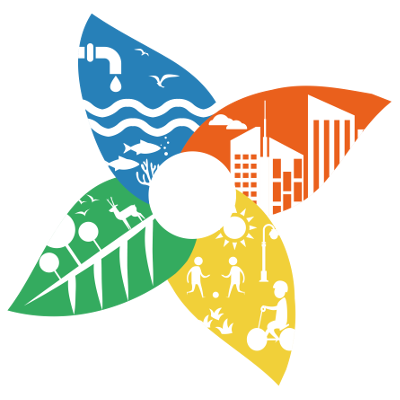Urban planning and climate change are closely interlinked. The way we build our cities affects both the local and the global climate. Dense urban development and paved inner cities not only generate more heat, they are also increasingly creating problems for city sewer systems. Rainwater cannot run off easily, so that the groundwater is more difficult to replenish, and the risk of flooding increases. Climate change is increasing this phenomenon, since extreme weather conditions such as heavy rain, droughts or heat waves are occurring more and more frequently.
The NATURVATION project, together with its partner and cooperation cities, has been exploring new pathways for addressing this problem. Bavaria’s state capital, Munich, is one of the case studies in the NATURVATION project. It is the most heavily sealed city in Germany. Almost half of the city's area is either built on or sealed with asphalt.
Since 2019, Munich has a funding program to address this problem. It promotes unsealing with up to 40 Euros per square meter. This allows funding for the greening of private courtyards and, under certain conditions, the premises of private companies. The funding has been increased from 23,000 to 80,000 Euros annually. Until today, more than 1,100 objects have now been greened or unsealed in this way. However, there are almost 173,000 residential buildings in Munich alone. Although interest in the funding program is increasing, the success still appears to be limited.
Rethinking has to take place.
The problems have to be addressed systematically and at a larger scale. Every day, a total of 56 hectares of land are redesignated as settlement or traffic areas in Germany. During one year, this corresponds roughly to the area of the city of Frankfurt.
To address this, the Federal Government of Germany wants to reduce land consumption to less than 30 hectares per day by 2030, and environmental associations are calling for a so-called circular economy. This means that only "new" land is designated if, in return, the same area is unsealed in another place. The city of Malmö in Sweden, which is a NATURVATION partner city, has also been looking into ways to compensate land consumption, developing related tools for the city scale.
Learning and dissemination through the NATURVATION project.
Nature-based solutions have to be systematically mainstreamed in urban planning and across cities’ sector work. There are increasing initiatives aimed at promoting unsealing and systematically mainstreaming from which we can learn from in this context. The partner cities in the NATURVATION project and their urban-regional innovation partnerships (URIPs) have fostered related advancements and joint learning. In addition, the URBAN NATURE ATLAS, elaborated during the NATURVATION project, is one of the first online sources that brings together existing efforts worldwide. In addition, the NATURVATION Massive Open Online Course (MOOC) on nature-based solutions provides a learning platform for both professionals and academics alike to learn from each other and join efforts.
If urban planners, together with private businesses and citizens, will manage to fight today’s asphalt deserts and land consumption, urban life will become more pleasant, ecosystems can be restored, and the supply of groundwater improved. The work of the NATURVATION partner and cooperation cities, together with the developed tools and courses, are one important step in this direction.
By Christine Wamsler, Professor at Lund University Centre for Sustainability Studies (LUCSUS) and knowledge broker within the Naturvation project.
